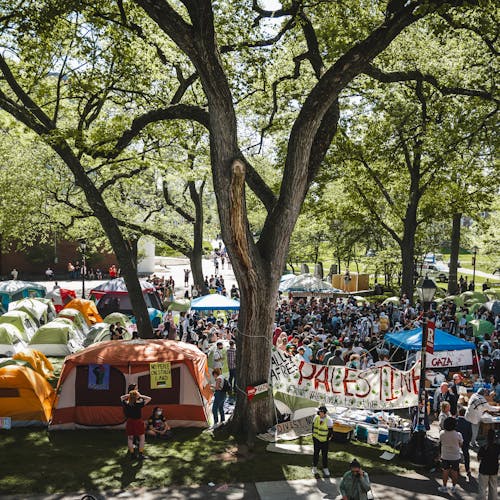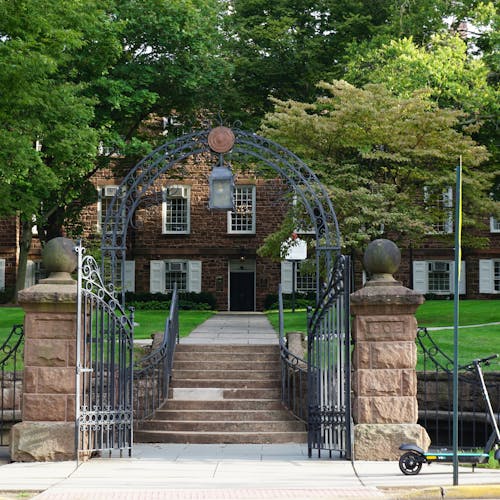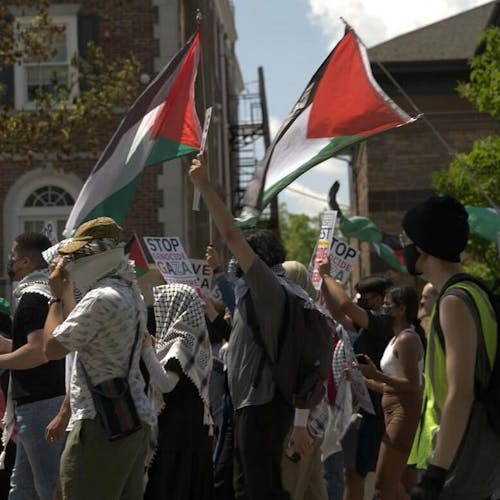Students for Justice in Palestine invites activists to speak at Rutgers

Students for Justice in Palestine hosted its highlight event of the semester on Monday, called “Show Me How to Rise.” The event featured two local activists who spoke about the Boycott, Divest, Sanctions (BDS) movement, a transnational effort to protest Israel's conduct in the Israeli-Palestinian conflict.
Abeerah Wasti, the president of Students for Justice in Palestine and a School of Arts and Sciences senior, said her organization's aim is to educate the Rutgers community about the conflict in Israel and Palestine. The group holds at least one event each semester.
The featured speakers were Taher Herzallah, the associate director of Outreach and Grassroots Organizing for American Muslims for Palestine, and Lamis Deek, an attorney and human rights advocate based in New York City.
Both speakers addressed a bill that was introduced in the Senate in March called the Israel Anti-Boycott Act. According to the website of the United States Congress, the bill would require the U.S. to oppose efforts by foreign countries to boycott U.S. allies and would prohibit American citizens engaged in foreign commerce from supporting boycotts of U.S. allies.
Both speakers said that the bill was unconstitutional.
Herzallah said the Israel Anti-Boycott Act has not advanced since its introduction in the Senate in March.
“That means there are some people high up in the Republican Party and others who are concerned about moving this bill forward,” Herzallah said. “That gives us hope.”
Executive Director of Rutgers Hillel Andrew Getraer said when regarding<g style="background-color: initial; font-size: 14px; color: rgb(51, 51, 51);"></g> the Israel Anti-Boycott Act being discussed in Congress, since 1977 U.S. law has prohibited American entities from participating in or cooperating with international boycotts organized by foreign countries, a law which has been upheld numerous times by our Federal courts.
He said the proposed statute merely expands the list of foreign boycotts with which it is forbidden to comply. The legislation does nothing to restrict anti-Israel expressions or even local “BDS activity.” Freedom of speech or expression is not threatened at all.
Herzallah said that the BDS movement was initiated in 2005 by hundreds of Palestinian civil society groups. In the 12 years since its initiation, members of the international community have joined, and Israel has come to be seen as an apartheid state, he said.
The BDS movement has gained support from many corners of society, Herzallah said.
Getraer said BDS is counterproductive to the goal of peace, antithetical to freedom of speech and are part of a greater effort to undermine the Jewish people's right to self-determination in Israel.
"BDS campaigns on campuses across the country have torn campuses apart, in many cases creating an atmosphere of intolerance and hatred against Jewish students, who themselves feel delegitimized and sometimes threatened," he said. "No one w<g style="color: rgb(51, 51, 51); font-size: 14px; background-color: initial;">ants</g> to see such division come to Rutgers, a campus which rightly celebrates our remarkable diversity and tolerance."
Getraer said that individuals and groups may have legitimate criticism of Israeli policies and that many Jews and virtually all Israelis do. But, he said, such criticism crosses the line into racist anti-Semitism, when it demonizes the world’s only Jewish State solely among all nations, denies Israel the right to defend its citizens, or seeks to denigrate Israel's right to exist.
Herzallah said that banks and retirement funds have divested their interests from Israeli companies and have refused to take contracts from Israel. While artists and authors have refused to perform in Israel, certain European Union governments have taken legal measures to prevent the sale of Israeli products and American academic institutions have suspended their relationships with or cut ties completely with Israeli institutions, as well.
“The movement has grown so big that Israel has spent an extraordinary amount of resources to fight what it calls the delegitimization of Israel,” Herzallah said. “An entire cabinet post has been created by the Israeli prime minister to take a strategic approach to fighting BDS. The Israeli minister of justice ... created an inter-department team to fight international boycott efforts.”
Moreover, he said, Israeli lobbies in the United States have influenced politicians and university administrators to repress movements against Israel.
Deek said that these lobbies have influenced U.S. criminal prosecution so that there is a pattern of selective and predatory policing, targeting Palestinians and those who might sympathize with Palestine in the future.
Deek criticized Israel's claim to the Israeli-Palestinian territory.
“It's like Swedish people saying, '6,000 years ago my people lived in Zimbabwe. I've got a historical connection to it, it's mine, I can prove it, get out. And I want an exclusively Swedish Zimbabwean state,” she said.
Deek said that the importance of BDS is that it rejects the legitimacy of Israel, thus preventing the normalization of Israel in the world order. She said that this has been successful in that global opinion favors Palestine.
Getraer said the BDS movement has been publicly opposed by numerous university presidents, governors and legislators and numerous international leaders, including the President of the Palestinian Authority himself, Mahmoud Abbas.
"Rutgers Hillel joins them in condemning BDS and calls upon students, faculty, administrators and other campus stakeholders to uphold the academic and democratic values of a free and civil discourse that promotes peace and tolerance," he said.
Deek said they have come from a place where our humanity was completely erased and criminalized, to now their struggle is what has become criminalized.
“We are winning in the sense that to this day it is Israel that continues to ask for legitimacy," he said.
Deek said that Palestinian resistance strategies have spread worldwide and have been adopted by American groups engaged in civil disobedience, including Black Lives Matter.
Despite the relative success of BDS, Deek said that the reality in Palestine remains “gloomy.”
“No regional stability and therefore no global stability will ever be possible so long as a large, non-integrated refugee population remains with grievances. You're talking about 6 to 7 million Palestinians in one of the most geo-militarily strategic places on Earth,” she said. “No stability will come until those grievances are addressed. That is historically and scientifically accurate.”



